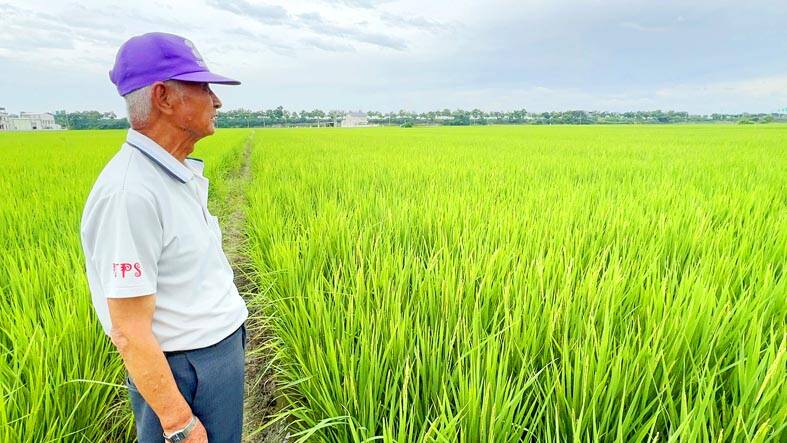The government must take into account WTO regulations before it adjusts the public grain procurement price, the Ministry of Agriculture said yesterday.
The price at which the government purchases grain is under scrutiny after opposition lawmakers proposed raising it to guarantee the income of rice farmers.
The public grain procurement price has not been adjusted for 13 years despite inflation, opposition lawmakers said in a written motion, adding that the government should raise the procurement price by NT$5 per kilogram to better protect farmers.

Photo: Lee Wen-de, Taipei Times
“The objective of the public grain procurement system is to increase the profits that farmers can make, which would not necessarily be achieved by increasing the procurement price,” Minister of Agriculture Chen Junne-jih (陳駿季) told reporters on the sidelines of an event in Taipei yesterday.
Any agricultural policy must ensure that farmers benefit from it and enable the agricultural industry to progress, Chen said.
Chen also warned that the public grain procurement system could contravene WTO regulations on reducing domestic support in agriculture.
“The WTO regulations impose a cap on domestic support in the agricultural industry. Any excessive financial support from the government could cause Taiwan to breach the regulations. It is a factor we must take into consideration when implementing any changes to the public grain procurement system,” he said.
Discussions over amending the public grain procurement system must consider different aspects, particularly as we are trying to join various international trade organizations, Chen said.
Former minister of agriculture Chen Chi-chung (陳吉仲) also warned that opposition lawmakers’ proposal would only push down the price of rice and would not increase the income of rice farmers.
Raising rice procurement prices could expand the nation’s rice fields from 23,000 hectares to 30,000 hectares, causing supply to further exceed demand, Chen Chi-chung said.
When 14,000 tonnes of annual rice imports is added, the excess supply of rice could top 500,000 tonnes, he said.
Such a policy could impede the progress that has already been made in diversification of grain production, he added.
For rice farmers to increase their income, Chen Chi-chung suggested that the government amend the rice income insurance system. The basic income for rice farmers who secure certifications for organic products, present production and sales history of their products, and adopt eco-friendly cultivation techniques can be NT$168,000 per hectare.
The income for cultivating rice is about NT$150,000 per hectare, and the insurance plan could make up the difference of NT$18,000, he said, adding that this is the only way to ensure that rice farmers can earn NT$5 more per kilogram.

CHANGING LANDSCAPE: Many of the part-time programs for educators were no longer needed, as many teachers obtain a graduate degree before joining the workforce, experts said Taiwanese universities this year canceled 86 programs, Ministry of Education data showed, with educators attributing the closures to the nation’s low birthrate as well as shifting trends. Fifty-three of the shuttered programs were part-time postgraduate degree programs, about 62 percent of the total, the most in the past five years, the data showed. National Taiwan Normal University (NTNU) discontinued the most part-time master’s programs, at 16: chemistry, life science, earth science, physics, fine arts, music, special education, health promotion and health education, educational psychology and counseling, education, design, Chinese as a second language, library and information sciences, mechatronics engineering, history, physical education

DEADLOCK: As the commission is unable to forum a quorum to review license renewal applications, the channel operators are not at fault and can air past their license date The National Communications Commission (NCC) yesterday said that the Public Television Service (PTS) and 36 other television and radio broadcasters could continue airing, despite the commission’s inability to meet a quorum to review their license renewal applications. The licenses of PTS and the other channels are set to expire between this month and June. The National Communications Commission Organization Act (國家通訊傳播委員會組織法) stipulates that the commission must meet the mandated quorum of four to hold a valid meeting. The seven-member commission currently has only three commissioners. “We have informed the channel operators of the progress we have made in reviewing their license renewal applications, and

The High Prosecutors’ Office yesterday withdrew an appeal against the acquittal of a former bank manager 22 years after his death, marking Taiwan’s first instance of prosecutors rendering posthumous justice to a wrongfully convicted defendant. Chu Ching-en (諸慶恩) — formerly a manager at the Taipei branch of BNP Paribas — was in 1999 accused by Weng Mao-chung (翁茂鍾), then-president of Chia Her Industrial Co, of forging a request for a fixed deposit of US$10 million by I-Hwa Industrial Co, a subsidiary of Chia Her, which was used as collateral. Chu was ruled not guilty in the first trial, but was found guilty

Taiwan People’s Party (TPP) Chairman Huang Kuo-chang (黃國昌) yesterday appealed to the authorities to release former Taipei mayor Ko Wen-je (柯文哲) from pretrial detention amid conflicting reports about his health. The TPP at a news conference on Thursday said that Ko should be released to a hospital for treatment, adding that he has blood in his urine and had spells of pain and nausea followed by vomiting over the past three months. Hsieh Yen-yau (謝炎堯), a retired professor of internal medicine and Ko’s former teacher, said that Ko’s symptoms aligned with gallstones, kidney inflammation and potentially dangerous heart conditions. Ko, charged with